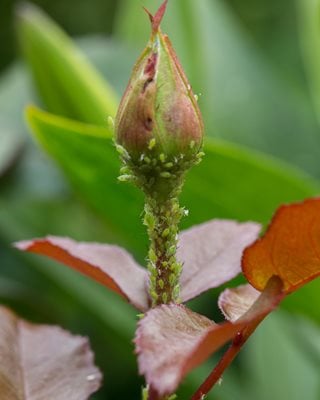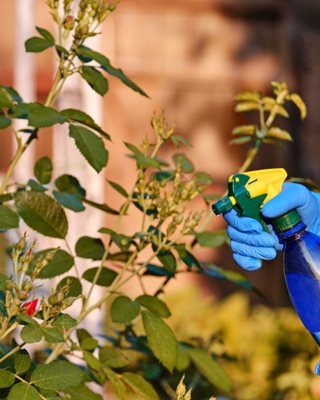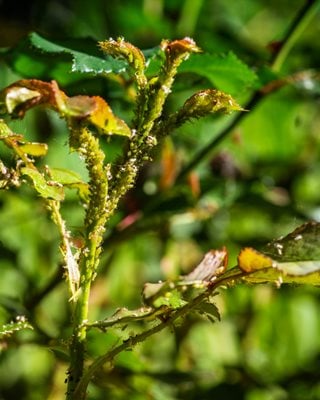How to Get Rid of Aphids on Roses
Protect your roses by controlling and eliminating these common garden pests
Photo by: S.O.E. / Shutterstock
Roses are one of the most popular garden plants, grown for their romantic blooms and delightful fragrance. These beloved plants can be prone to a number of pests, particularly aphids, which are attracted to roses for the sweet sap that’s found inside the leaves, stems, and buds.
Aphid populations can multiply quickly, infesting plants in a short amount of time. A major aphid infestation can cause serious damage to plant tissue, weakening or even killing plants. Here’s how to identify and control aphids on roses.
On this page:- WHAT ARE APHIDS?
- HOW DO YOU GET RID OF APHIDS ON ROSES?
- HOW TO PREVENT APHIDS ON ROSES
- HOW DO APHIDS AFFECT ROSES?
- HOW TO RECOGNIZE THE PRESENCE OF APHIDS ON ROSES
- WHAT DOES APHID DAMAGE LOOK LIKE ON ROSES?
- FREQUENTLY ASKED QUESTIONS
WHAT ARE APHIDS?
Aphids are a common garden pest that feed on plant sap. They cause damage to a wide variety of plants, including roses. Adult insects are 1/16-inch to 1/4-inch long, with oval-shaped bodies. These soft-bodied insects are usually found in clusters.
Aphids can overwinter on plants and underneath leaves or mulch, with eggs hatching in early spring. Newly hatched larvae feed on plants and begin to lay eggs when they become adults. Most aphids are wingless and move by crawling, though some adults can develop wings. These pests occur in most climate zones. (Learn more about aphids.)
HOW TO GET RID OF APHIDS ON ROSES

Photo by: Nataliia Maksymenko / Shutterstock
There are a number of safe organic methods to control aphids on roses. The use of chemical pesticides is not recommended, as they can cause harm to beneficial insects and wildlife. Here’s how to get rid of aphids on roses:
- Spray water. Apply a moderately strong spray of water to dislodge pests. Make sure the spray is strong enough to knock off the insects, but not so strong as to cause foliage and flowers to become damaged or stripped off the rose plant. Spray early in the day and allow foliage to dry out to help prevent the spread of fungal diseases.
- Use soap. A solution of water and soap is an effective pest control that can be used to kill aphids on your rose bushes. Use a mild liquid soap (not detergent), such as Ivory, and mix 1 tablespoon of soap with 1 quart of water. Apply with a spray bottle. You can also use a pre-mixed commercial insecticidal soap such as Safer’s brand.
- Apply neem oil. This natural pesticide is made from oil that is pressed from the seeds of neem trees (Azadirachta indica). Neem oil inhibits the ability of aphids to move and feed, interrupts the life cycle, and smothers the insects. Use neem oil according to instructions and make sure to coat the entire rose plant, including the undersides of leaves where aphids may be hiding. Learn more about how to use neem oil.
- Introduce insect predators. Green lacewings and ladybugs (also known as lady beetles) feed on aphids. Both are more effective at controlling aphids in the larval stage. Attract these natural enemies by including their favorite plants in your garden, such as dill, fennel, mint, Queen Anne’s lace, thyme, and yarrow. Live ladybugs and lacewing eggs can be purchased online or in nurseries and garden centers.
- Attract birds. Many songbirds such as finches, warblers, and sparrows feed on aphids. Provide water, food, shelter, and places to nest to attract and keep these birds in your yard.
HOW TO PREVENT APHIDS ON ROSES
To keep aphids from taking hold in your yard, try these tips:
- Keep plants healthy. Healthy roses are better able to stave off pests and diseases.
- Check plants regularly. Inspect your plants regularly for any signs of aphids or other pests. Examine nursery plants carefully before bringing them home to prevent the spread of pests to other plants.
- Deter pests. Aphids and other pests are repelled by plants such as garlic, onion, chives, catnip and marigolds. Site these near your roses to deter aphids.
- Avoid over-fertilizing. Too much fertilizer can result in rapid new growth on roses, which attracts aphids.
- Use plants to attract aphids away from roses. Plants such as mustard, nasturtium, sunflower, and nettles are attractive to aphids. Plant these at a safe distance as a diversion to lure aphids away from your rose bushes.
HOW DO APHIDS AFFECT ROSES?

Photo by: Nataliia Maksymenko / Shutterstock
Aphids have sharp chewing mouthparts which are used to pierce plant tissue, extracting sap from rose leaves, stems and flower buds. This causes a loss of nutrients and water, which stresses and weakens the plant. Damaged rose bushes can become more susceptible to other pests and diseases. Some aphid species can transmit viruses between plants. In extreme cases, plants can die if aphids are not controlled.
While feeding, aphids excrete a sweet sticky substance called honeydew which can lead to the development of sooty mold, a black substance that prevents light from getting to the foliage. This interferes with photosynthesis, which can hinder rose plant growth.
HOW TO RECOGNIZE THE PRESENCE OF APHIDS
Though aphids are small, they can be seen with the naked eye. Here’s what to look for:
- Aphids prefer feeding on tender new plant growth, which is easier for their mouthparts to pierce. Look for aphids on rose buds and the tips of new leaf shoots. They will appear as clusters of green, white, black, red or brown bugs. Inspect leaf undersides where aphids like to hide.
- Look for shiny or sticky leaves, which is a sign of aphid secretions.
- Note the presence of ants. The sticky sap that aphids excrete attracts ants, which feed on the secretions.
- Look for patches of black sooty mold covering leaves, buds, or stems that develop from aphid secretions.
IDENTIFY APHID DAMAGE ON ROSES
Symptoms of aphid damage to rose bushes include:
- Curled, shriveled, wilted or discolored leaves
- Stunted or misshapen foliage growth
- Buds and blooms that are less vigorous, deformed or distorted
- Flower buds that have fallen off the plant
FREQUENTLY ASKED QUESTIONS
Can you spray vinegar on roses for aphids?
A solution of 1 part white vinegar to 3 parts water is sometimes cited as a remedy to treat aphids. Sensitive plants may incur foliage burn, so make sure to test a small area before applying to roses or any other plants.
What type of aphids infest roses?
There are many types of aphids that can cause damage to a wide variety of plants. Aphids that most commonly attack roses are rose aphid (Macrosiphum rosae) and potato aphid (Macrosiphum euphorbiae), which are reddish brown, green, or pink.
RELATED:
Garden Pests & Diseases
Getting Rid of Japanese Beetles
How to Get Rid of Grub Worms


